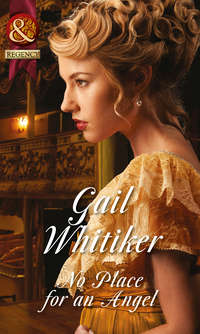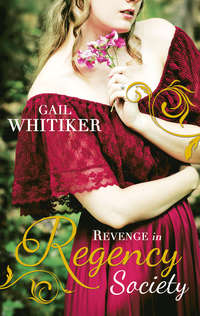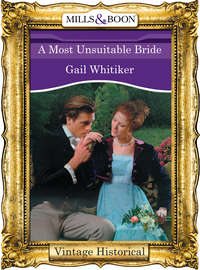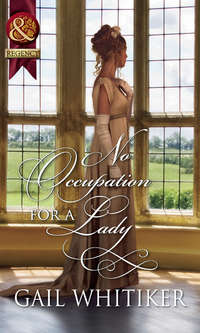
Полная версия
An Innocent Deceit

“Miss Hadley, I have the distinct impression that you do not like me.”
“My lord, I cannot imagine why you would say such a thing.”
“Nevertheless, I have been aware of the chill in your voice from the occasion of our first meeting. Have I offended you in some way, Miss Hadley? Were you annoyed that I sought you out in the music room?”
“My lord, I can assure you that I was neither offended nor annoyed by your appearance that morning. I really do not know what else to say except…”
Carlyle placed the tips of his fingers gently against her lips. “Then say nothing. Because I would far rather imagine that you might miss me than hear from your lips that you should not.”
An Innocent Deceit
Gail Whitiker

GAIL WHITIKER
Originally hailing from Pembrokeshire, England, Gail Whitiker now lives on beautiful Vancouver Island on the west coast of Canada. When she isn’t indulging her love of writing, you’ll find her enjoying brisk walks along the island’s many fine beaches, or trying to catch up on her second love, reading. She wrote her first novel when she was in her teens, and still blesses her English teacher for not telling her how bad it really was.
Contents
Chapter One
Chapter Two
Chapter Three
Chapter Four
Chapter Five
Chapter Six
Chapter Seven
Chapter Eight
Chapter Nine
Chapter Ten
Chapter Eleven
Chapter Twelve
Chapter Thirteen
Chapter One
‘No, my dear, I am very sorry, but I really cannot agree to the idea of your working for the Earl of Carlyle,’ Mr Hadley told his daughter regretfully, ‘and certainly not in the capacity you have just set forward.’
‘But, Papa—’
‘Why, only think what your aunt would say if she were to hear of it. Indeed, I wonder what your dear mother would have said, had she lived to see what you were about.’
Miss Antonia Hadley, recipient of this most disappointing news, shook her head in a gesture of mild resignation. While she had not expected this to be easy, neither had she expected her father to be so rigidly opposed to what she considered to be a perfectly splendid idea.
‘I venture to say that aunt Ophelia will be shocked and horrified, as no doubt you already suspect, and that she will shake her head and wonder if there is any hope for me at all. But as regards Mama,’ Antonia said, her voice softening, ‘I believe that she would have applauded my ingenuity and commended me to proceed. As I truly wish you could see your way clear to doing, Papa. After all, we did agree that I had to do something.’
Seated behind his desk Mr Hadley glanced up at his daughter in surprise. ‘I beg your pardon?’
‘Well, yes. Do you not remember?’
‘What I remember is that you informed me that it was your intention to seek employment, whereupon I informed you that it was neither necessary nor fitting that you do so. Is that not more the way the conversation went?’
Antonia tried not to smile, but failed. Odious man. He might have been able to persuade others of his absent-mindedness, but he had never been able to fool her. He was now, as he had always been, in possession of an annoyingly retentive memory.
‘You may be right, now that I come to think of it, Papa,’ Antonia allowed grudgingly, ‘but that does not alter the fact that I should very much like to do something with my time. After all, I am nearly twenty years of age, yet all I seem to do is write letters and pay tedious house calls.’
‘Tedious?’ Mr Hadley frowned. ‘I thought young ladies liked paying house calls.’
‘Not every day.’
‘Well, then, what about the management of Buntings Hill? Surely that is more than enough to occupy your time, since you do it almost single-handedly.’
‘Tosh! Mrs Grenfall is in charge of the household now. All I do is review the accounts and approve the meals, and goodness knows, even that requires little enough of my time. But if I were working for the Earl, I should be required to spend…at least two hours a day at Ashdean. Which is why I think this is the best opportunity to have come along so far.’
‘The best opportunity?’ Mr Hadley chuckled as he removed his spectacles and wiped them with a remnant of cloth which deposited far more dust than it removed. ‘My dear girl, this does not even approach the designation of a good opportunity, let alone one deserving of a higher commendation. For a young woman in your position, I would have thought that an offer of employment from the Dowager Countess of Haversham would have been far more worthy of your consideration.’
‘Lady Haversham?’
‘Yes. She is looking for a companion.’
‘What, again? What happened to Miss Marchmaine?’
‘I understand the young lady left to take care of her elderly mother.’
‘But…she already has two younger sisters at home doing just that.’
Mr Hadley leaned back in his chair, and steepled his fingers in front of his face. ‘Perhaps the mother’s health took a turn for the worst and the sisters felt compelled to call Miss Marchmaine home. I really do not know, Antonia, that was all Mrs Heath was able to tell me when I chanced to come upon her in the village yesterday. However, I do think it a more appropriate position for a lady than to be a groom in the household of the Earl of Carlyle.’
Antonia’s mouth twitched. ‘I am not applying to be a groom, Papa. The Earl is looking for someone to teach his daughter how to ride.’
‘Semantics. It entails working with horses, does it not?’
‘Yes, which is precisely why I wish to apply. You have told me that I am an exceptional rider—’
‘Much as I am beginning to wish that I had not—’
‘And you know that I enjoy working with children,’ Antonia continued, ignoring his interruption. ‘This provides me with an opportunity to do both.’
‘Children?’ Mr Hadley regarded her with a suddenly hopeful expression. ‘My dear, if it is the company of children you seek, perhaps it is Lady Cruikshank’s offer you should be considering.’
‘Lady Cruikshank? But—’ Antonia paled ‘—surely you cannot mean as governess to those five wretched children of hers?’
‘Well, yes, actually, I do. Why, what have they done?’
‘Only retire three governesses in the past nine months. And last week, even the housekeeper threatened to quit!’
‘Good Lord, Mrs Mortonby? Whatever for?’
‘It seems that she found a reptile in her bed.’
‘A reptile?’
‘A snake.’
‘Oh, dear. Common garden variety, I hope.’
Antonia blinked. ‘Does it matter?’
‘Well, yes, my dear, I rather think it does. After all, one would be considerably more alarmed at finding a viper in their bed than a harmless—’
‘The fact that she found any manner of snake in her bed—and that it was put there by those dreadful children—is reason enough for me to wish to stay well away from them, Papa,’ Antonia interrupted, aware that her father was just as like to embark on a biological discussion as he was to give her a straightforward answer. ‘Goodness knows, a lady of weaker constitution might have…expired from the discovery of such a creature in her bed.’
‘Ah. Well, in that case, I doubt that Mrs Mortonby was in any real danger,’ said Mr Hadley as he set the smudged spectacles back on his nose. ‘Of the two, I would wager that the snake was the more terrified. However, given that no one was hurt, I do not see that there is any reason for endowing what was obviously a childish prank with any malicious intent. Certainly, I was not above doing such things when I was their age.’
‘Which is the only reason I can think of for you to have suggested that I look after them in the first place,’ Antonia said wryly. ‘I thought I had been a better daughter to you than to warrant being condemned to such a cruel fate as that.’
‘You have been the best of daughters, my dear, and I would not knowingly condemn you to any fate but one of your own choosing,’ her father replied fondly. ‘But in all sincerity, I cannot be happy about this notion of yours to seek a position with the Earl of Carlyle.’
Antonia sighed as she crossed to the window seat and picked up her copy of La Belle Assemblée. This was not turning out at all as she had hoped. In her opinion, Lady Cruikshank and Lady Haversham were two of a kind, which was likely the real reason for Miss Marchmaine’s departure. Both women possessed an uncanny knack for retiring any and all manner of domestic help with alarming haste and disturbing regularity.
‘Well, my dear?’ Mr Hadley said. ‘You have not yet answered my question. Is it your intention to approach the Earl with regard to this position?’
‘I am not sure that I know what to do any more, Papa,’ Antonia replied in all honesty. ‘While teaching the Earl’s daughter how to ride would be eminently preferable to serving as a companion to Lady Haversham, or as a governess to Lady Cruikshank, it is obvious that it would cause you more grief than the other two put together, and I certainly have no wish to do that.’
Mr Hadley sighed. ‘What grieves me the most, Antonia, is that you feel the need to seek any manner of employment. You are a beautiful and accomplished young woman. One whom any man would be proud to call his wife. To my mind, you should be thinking about marrying the Earl, not seeking employment in his household!’
‘Marry the Earl!’ Antonia gasped. ‘Gracious, Papa, what an alarming thought.’
‘You find the thought of becoming a Countess alarming?’
‘I find the thought of becoming Carlyle’s Countess alarming,’ Antonia replied without hesitation. ‘He is a cold and arrogant man who cares little for the feelings of others, and who takes no trouble to conceal it. I cannot think of any man to whom I would less wish to be married.’
‘Goodness, a harsh condemnation indeed,’ Mr Hadley observed. ‘But one, I wonder, which is based upon your own assessment of the gentleman’s character, or upon the opinions of others? For unless I am mistaken, you have not had occasion even to see Lord Carlyle these past eight years, let alone speak with him.’
Antonia felt her cheeks grow warm. ‘It is not always necessary to speak to a gentleman to know the manner of his character. I have heard from more than one source that Lord Carlyle is an exceedingly arrogant man who is very much aware of his position in society, and who prefers not to associate with people of a lesser social consequence as a result. Which means that he is no more likely to notice me than he is…a fly upon his wall.’
The remark brought a smile to her father’s face. ‘I think that the stories which have reached your ear have been somewhat exaggerated, my dear. I have not heard tales of such colossal arrogance myself. But tell me, if Lord Carlyle were to notice you, and if he were to seek you out, would you entertain his suit?’
‘No.’
‘No. You would refuse a peer of the realm simply because of something one of your friends had said?’
‘I would refuse him because I do not like him, Papa,’ Antonia said, wishing she could make her father understand. ‘We have absolutely nothing in common. Everyone knows that Lord Carlyle despises the country. He has made no secret of the fact that he prefers to live in London, where he keeps a very fine house and a veritable army of servants to dance attendance upon him. Whereas I, on the other hand, can think of nowhere I would rather live than here at Buntings Hill with you.’
‘Bless you for saying so, my child, but the fact that Lord Carlyle prefers to live in London cannot be held against him,’ Mr Hadley said reasonably. ‘He is the Earl, after all, and entitled to the privileges of his rank. I do not see that as being a valid reason to reject him outright.’
‘No, but that is not the only reason, Papa.’ Antonia turned her eyes towards the lush green hills that were visible through the window, and sighed. ‘When you consider that he has no feelings for his child—’
‘I beg your pardon? Lord Carlyle not care for Clara? Now that I must take exception to.’ Mr Hadley’s brows drew downward in a frown. ‘Where in the world did you come by such a ridiculous notion as that?’
‘It is not ridiculous, nor am I the only one who believes it,’ Antonia said in her own defence. ‘Lord Carlyle took Clara to Ashdean immediately following his wife’s death, and left her there for two years. And in all that time, how many visits has he paid her?’
‘Few enough, I admit, but the paucity of his visits cannot be interpreted as a lack of affection on his part,’ Mr Hadley objected. ‘A parent’s love for his child should never be measured by the frequency—or infrequency—of his visits. I am sure that the Earl would have wished to spend more time with Clara, but for his position in life—’
‘His position in life does not justify negligence towards his child,’ Antonia said tersely. She rose from the window seat and began to pace back and forth in front of her father’s desk. ‘Your charity does you credit, Papa, but in this instance, I find I cannot agree with it. If Lord Carlyle truly cared about his daughter, he would have found the time to visit her. Instead, he continues to leave her in the country, all but abandoned to the care of servants, and only makes his presence known when it pleases him to do so. Hardly commendable behaviour for a father to my way of thinking!’
Mr Hadley studied his daughter’s angry face, whilst an expression of amusement appeared on his own.
‘Antonia, if you dislike the man so intensely, why are you even thinking about working for him?’
‘Because I like his daughter very much and I know that she needs my help.’ Antonia’s voice gentled as it always did when she spoke of the Earl of Carlyle’s daughter. ‘Lady Clara is a sweet and intelligent child who is quick to respond and remarkably eager to learn. But she is lonely, Papa. She lives in that great house all on her own, with only the servants and her spaniel for company, and her father seems quite content to leave it that way. Well, I am not. A six-year-old child needs love and affection, and I believe that the opportunity of teaching Clara how to ride would be a wonderful experience for both of us. And that, I can assure you, is the only reason I would consider working for her father.’
‘Well, I still think you judge him too harshly, my dear,’ Mr Hadley said, returning his attention to the papers on his desk. ‘Lord Carlyle has not led a happy life. Have you forgotten that in the space of a few short years, he lost both a father whom he loved and a beautiful young wife?’
Antonia shook her head as she gave up pacing to lean against the edge of his desk. ‘I have not forgotten. But neither do I believe that his prolonged indifference to Clara can be justified by the tragic events of the past. Lady Carlyle has been gone well over two years. Surely that is long enough for the Earl to have recovered from his grief.’
‘Perhaps. But you must remember that not everyone is like you, Antonia,’ her father said gently. ‘Not everyone behaves in exactly the same way, especially when it comes to matters of the heart. And at such times, you would do well to be more tolerant of those whose behaviours differ from your own. At least until you find yourself in a similar position.’
A quick glance at her father’s face assured Antonia that nothing would be gained by prolonging the argument now and, grudgingly accepting defeat, she slowly began to smile. ‘Dear Papa. I must be such a strain on your patience. No doubt you are wondering why you were not blessed with an obedient daughter who would have married and had children, and not given you any cause for concern. I would have been a good deal less troublesome, would I not?’
‘You would,’ her father agreed, ‘but then you would not have been my Toni, and I cannot imagine you being any other way than you are. However, I do understand what you are saying. You wish to help the child—without encouraging the father.’
‘Precisely.’
‘Because you have absolutely no interest in the Earl of Carlyle as a husband.’
‘None whatsoever.’
‘Fine. Then I suppose there is nothing for it but that we send you up to London for the Season as your aunt has suggested. It is only fair that you be given an opportunity to meet the right kind of gentlemen, and I doubt very much that you will do that here.’
Antonia’s face softened. ‘Papa, you know that the cost of a Season is well beyond our means at present, and pray do not try to pretend that it is otherwise. I have seen Mr Ludlow come and go any number of times these past few weeks, and I know what that means.’
‘The fact that a gentleman speaks to his man of business need not signify that we are under the hatches, Antonia,’ her father said wryly.
‘No, but I am well aware that our income is no longer sufficient to ensure the adequate maintenance of the property. Only look at the sorry state of the gardens, Papa,’ Antonia said, returning to the window and waving her hand in the direction of the gardens which, once immaculate, were now sadly overgrown with grass and weeds. ‘We can no longer afford the services of a gardener, and only last week Abbott informed me that a new hole had appeared in the stable roof.’
‘I have spoken to Mr Ludlow regarding the roof, and he has assured me that there is money enough to see to its repair. As regards your going up to London for the Season, I intend to speak to Ophelia and—’
‘Oh, no, Papa, pray do not!’ Antonia said with a groan. ‘We both know there will be little enough to be gained for your trouble. Aunt Ophelia will not settle any money on me until I am married, and I certainly do not intend to rush into marriage simply to appease her.’
‘You must try not to think too harshly of your aunt, my dear. No doubt Ophelia is only doing what she believes to be in your best interests.’
Antonia’s lips compressed into a narrow line. Lady Farrington, her mother’s eldest sister, was in possession of a considerable sum of money which Antonia’s grandmother had set aside for her dowry—money which would have significantly eased the constraints under which she and her father were currently living. Unfortunately, Lady Farrington now seemed reluctant to part with the money, saying that, as Antonia was nearly twenty, and still showing no inclinations towards marriage, it was incumbent upon her to hold on to the money until such time as she felt her niece was responsible enough to look after it herself. Which meant, of course, being married.
As such, Antonia had endeavoured to forget about her inheritance and to look elsewhere for the funds which would support them. This was why the position of riding master to the Earl of Carlyle’s six-year-old daughter Clara had appealed so much.
Antonia had met the Earl’s daughter a year earlier, at the Christmas party held at the vicarage. Lady Clara, a delicate child with the most astonishing blue eyes Antonia had ever seen, had been brought to the party by her governess in the hopes that the child would meet and mingle with other children her own age. But when Lady Clara had arrived at the entrance to the crowded room and seen upwards of thirty-five little boys and girls, all intent upon their games, she had stopped dead, clearly overwhelmed by the sights and sounds of so many children laughing and playing within.
Fortunately, Antonia had been standing close to the door and had noticed the child’s dismay at once. She had wondered at it too—until she had learned that it was the Earl of Carlyle’s daughter who stood so timidly in the doorway—and then all had become clear. Lady Clara had never been exposed to a Christmas party like this before and, no doubt after the solitude of Ashdean, it had all seemed rather frightening.
With that in mind, Antonia had quickly made her way to one of the sweet tables and selected a piece of gingerbread which had been baked in the shape of a little boy. After exchanging a few words with the child’s governess, Antonia had bent down to greet the Lady Clara, smiling all the while into those wide blue eyes, and had tried to put the child at ease.
At first, Clara had continued to play shy. She had hidden behind her governess’s skirts, peeping out at Antonia with reluctant curiosity, and then ducking back behind Eva’s skirts again. But when the gingerbread man had tentatively been offered, Clara had slowly come forward. Her glance had gone from the face of the pretty lady, to the pastry and then back again, and when, eventually, a chubby little hand had reached out to take the treat, Clara had glanced up at Antonia with those incredible blue eyes—and smiled.
It was a smile which had brought about Antonia’s total capitulation. It had wrapped around her heart, captivating her with its total innocence and convincing her of the child’s heart-wrenching need to be loved.
After that, Antonia had taken pains to visit Lady Clara at Ashdean at least once, and sometimes twice, a week. They would sit together in the nursery and read, or go for long walks through the park. Or sometimes they would just sit in the orchard and look at the clouds drifting by overhead. They had laughed together over the silliest of things, and it was during those early days that the bond between Antonia and Clara had truly been forged.
But it was in more recent days that Antonia had discovered something about the child which had given her genuine cause for alarm. Something she had not even guessed at before.
Clara was afraid of horses. On the few occasions they had walked past the stables, or when they had stood watching the gentle cart horses as they grazed peacefully in a field, Antonia had seen the fear in the child’s eyes, and the way she had held back.
And that had shaken Antonia. Because she knew all too well what it could mean. She had already witnessed, in the most terrifying and personal way possible, what fear could do to a child. Which was why, when Eva had let slip that his lordship was looking for someone to teach Clara how to ride, there had been no question in Antonia’s mind as to what she had to do.
She had to secure the position. It was imperative that she be the one to introduce Clara to horses, and to the art of riding them. Because she had to try to banish the child’s fear. Antonia shuddered to think what might happen if Clara was to be taught by someone who did not recognise that failing in the child, or who tried to force it out of her.
From a practical point of view, the position also offered Antonia a solution to her other dilemma; namely, the finding of additional funds for the ongoing maintenance of Buntings Hill, a problem which, despite her father’s protestations to the contrary, Antonia knew to be of growing concern.
Lastly, it would spare her the tedium of having to sit as a companion to a fussy old lady like Lady Haversham, or to be responsible for the care of a brood of obnoxious, ill-mannered children like Lady Cruikshank’s. Now, if she could only convince her father of its eminent advantages, everything would be just—
‘Antonia, are you listening to me?’
‘Hmm?’ Antonia looked up, and then guiltily shook her head. ‘Forgive me, Papa, I was not. What were you saying?’
‘I was saying, that, quite apart from my reluctance to see you proceed with this, you should be aware that far more formidable objections may arise from the Earl of Carlyle himself. It is well known that he is loathe to take on female servants.’
That was a truism which Antonia had already been forced to consider. Apart from Lady Clara’s governess and Mrs Griffiths, the cook, there was not another female servant in the Earl of Carlyle’s employ, either here, or at his home in London.
‘I realise that the Earl is not generally known for his hiring of female staff,’ Antonia conceded, ‘but in this instance, I cannot help but feel that once he is made aware of all the advantages, he will have to recognise the wisdom of hiring me. For one thing, I am already acquainted with his daughter and get on with her exceedingly well. She trusts me, Papa, and you know how important that trust will be if I am to teach her to ride properly.’






